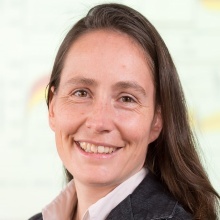What is the research field of your group?
Life on our planet is fascinating and has an amazing complexity. How does a bacterial cell manage to adapt to different conditions and react reliably to external influences and signals? What processes take place in the body during the development of diseases and how can we effectively counteract them? How do different cells in our body communicate with each other and what happens when this communication is disturbed?
These are all exciting questions for which it is helpful to understand living systems as a complex dynamic network of interacting components. We are primarily interested in processes and regulatory mechanisms on a very small scale. More specifically, cells that are too small to be detected by the human eye. Our research is concerned with mathematical modeling, simulation, and analysis of intracellular processes and their relationship to phenotypic traits at larger scales.
We would like to contribute to a better holistic understanding of these processes. Ultimately, with the goal of being able to change and specifically influence these processes. We conduct research in close collaboration with colleagues from the life sciences. Our focus is on concepts for data-driven modeling and the integration of single-cell and bulk data into computer models. For this purpose, we mainly use statistical methods, which allow to consistently estimate uncertainties in all model variables. My vision is to arrive at reliable predictions about the functioning of biological systems based on empirical evidence and mathematical models. The strong profile area of simulation sciences in Stuttgart has had a significant influence on my research. Last but not least, the potential area of biomedical systems gives us as a research group the exciting opportunity to focus our research even more on clinical questions such as the course of diseases and the optimization of personalized therapies. The three focal points of our work are concrete:
- data-based modeling and model-based design of cellular processes.
- (Stochastic) modeling approaches to describe heterogeneity in cell populations.
- statistical sampling-based methods for model identification and uncertainty estimates.
With my working group, I would like to contribute to a close networking of Faculty 8 with colleagues from the life sciences, especially Faculties 3 and 4.
Why is interdisciplinary research needed for this?
Our methodological approaches to modeling and model analysis can be assigned to applied mathematics. Nevertheless, I always attach great importance to the fact that my research group is composed in an interdisciplinary way, in accordance with the Stuttgart way of networked disciplines. This ensures a lively exchange within the working group. In many projects, we are the link between experimentalists, statisticians, physicians and other researchers. We set up models to make complex processes in living systems understandable. In this way, ideas about biological systems are tested and often other mechanisms of action are discovered than originally assumed.
The Department of Mathematics, and in particular our Cluster of Excellence Data-Integrated Simulation Sciences, the SC SimTech and the Stuttgart Research Center Systems Biology (SRCSB) offer me optimal conditions and an ideal environment to work on complex problems across disciplinary boundaries and to exchange ideas.
What particularly excites you about your work?
As a professor, I have a lot of freedom and a great deal of creative freedom. I can choose which topics I research and how I design projects. It's similar for teaching. My job allows me to try things out and experiment. On the other hand, I always deal with motivated young people who have a qualification goal in mind, are curious and eager to learn. In my role, I get to accompany many of them a bit on their way and also learn myself in the process. I consider this a special privilege.
What prior knowledge do students need to enter your field of research as part of a student thesis or doctoral dissertation?
This is difficult to answer in a general way, since it depends strongly on the project, at least for a bachelor or project thesis. Helpful for most topics are first experiences in a programming language (preferably Python), basic mathematical knowledge, as well as an interest in interdisciplinary topics in the field of life sciences.For a master thesis it is helpful to have attended courses in modeling and / or statistics / stochastics.Especially for a PhD it is important to enjoy communication and interdisciplinary exchange.This also includes dealing with other disciplines to some extent in order to be able to build bridges.Fortunately, I have a great group in which this works very well.
Prof. Nicole Radde
Systems Theory in Systems Biology
Institute for Stochastics and Applications


